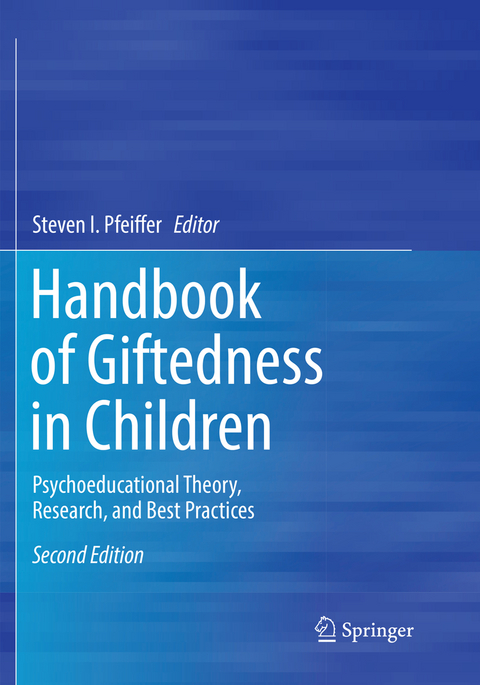
Handbook of Giftedness in Children
Springer International Publishing (Verlag)
978-3-030-08345-8 (ISBN)
The second edition of this handbook incorporates the latest theory, research, and best practices in serving gifted and talented children and adolescents. The expanded and updated edition explores new and emerging ideas, themes, and findings, including the latest research from neuroscience and developmental psychology. It incorporates expanding conceptions of giftedness among researchers as both general and domain-specific as well as the value of viewing giftedness from a developmental perspective. Chapters discuss a wide range of topics including assessment, the role of family in nurturing talent, and issues specific to subgroups such as disadvantaged gifted children and gifted children with special needs. In addition, the handbook provides guidelines for creating relevant interventions and designing curriculum for this diverse population.
Topics featured in the Handbook include:
· The social and emotional world of the gifted.
· Emotional intelligence and the gifted.
· Perfectionism in gifted students.
· Depression and suicide among gifted children.
· Career counseling for the gifted and talented.
· Best practices in the identification and assessment of the gifted.
The Handbook of Giftedness in Children, Second Edition is a must-have resource for researchers, clinicians and related professionals, policy makers, and graduate students across such interrelated disciplines as child and school psychology, social work, and education policy and politics as well as special and general education, public health, school nursing, occupational therapy, psychiatry, school counseling, and family studies.
Steven I. Pfeiffer, Ph.D., is a Professor at Florida State University. Previously, he was a Professor at Duke University, where he served as Executive Director of the Duke University Talent Identification Program (Duke TIP). Dr. Pfeiffer is an internationally recognized expert in the gifted field. According to Alan Kaufman, Dr. Pfeiffer is "among a small group of the world's leading experts in the gifted field. He is an unusually articulate spokesperson on the varied topics that comprise the broad domain of gifted education and gifted assessment." Dr. Pfeiffer twice testified at the White House before the National Task Force on Health Care Reform. In 2012, he was a Distinguished Visiting Scholar at the National Institute of Education in Singapore. He has an active clinical practice and conducts workshops in the United States and internationally. Dr. Pfeiffer is lead author of the Gifted Rating Scales (Pearson Assessment, 2003), the most widely used rating scale in gifted identification. His most recent books include, Serving the Gifted (Routledge, 2013); Essentials of Gifted Assessment (Wiley, 2015); and The Social and Emotional Development of Gifted Children (Prufrock Press, 2015), co-edited with Maureen Neihart and Tracy Cross. He is Editor-in-Chief of the APA Handbook of Giftedness and Talent (Washington, DC: APA Books; in press).
Chapter 1. History of Giftedness: Paradigms and Paradoxes.- Chapter 2. An International View on Gifted Education: Incorporating the Macro-Systemic Perspective. Chapter 3. Theories and Conceptions of Giftedness.- Chapter 4. The Social and Emotional World of the Gifted.- Chapter 5. Expertise and Individual Differences.- Chapter 6. Creativity.- Chapter 7. Emotional Intelligence (EI) and the Gifted.- Chapter 8. Gender and Talent Development of Gifted Students.- Chapter 9. The Role of the Family in Talent Development.- Chapter 10. Looking Back and Looking Forward: Curriculum for Gifted and Talented Students.- Chapter 11. Applicable Federal and State Policy, Law, and Legal Considerations in Gifted Education.- Chapter 12. Assessment of Giftedness.- Chapter 13.Recruiting and Retaining Underrepresented Gifted Students.- Chapter 14. Perfectionism.- Chapter 15. Depression, Suicide, and Giftedness: Disentangling Risk Factors, Protective Factors, and Implications for Each.- Chapter 16. Understanding Underachievement.- Chapter 17. Counseling the Gifted: Current Status and Future Prospects.- Chapter 18. Career Counseling for the Gifted and Talented: A Lifespan Development Approach.- Chapter 19. Ethical and Professional Practice Issues in the Provision of Educational Services to Gifted Students.- Chapter 20. Identifying and Providing Evidence-Based Services for Twice-Exceptional Students.
| Erscheinungsdatum | 14.01.2019 |
|---|---|
| Zusatzinfo | XI, 374 p. 11 illus., 7 illus. in color. |
| Verlagsort | Cham |
| Sprache | englisch |
| Maße | 178 x 254 mm |
| Gewicht | 736 g |
| Themenwelt | Geisteswissenschaften ► Psychologie ► Entwicklungspsychologie |
| Geisteswissenschaften ► Psychologie ► Pädagogische Psychologie | |
| Medizin / Pharmazie ► Medizinische Fachgebiete ► Psychiatrie / Psychotherapie | |
| Sozialwissenschaften ► Pädagogik ► Sonder-, Heil- und Förderpädagogik | |
| Sozialwissenschaften ► Pädagogik ► Sozialpädagogik | |
| Schlagworte | Assessment measures and giftedness • Career planning and gifted students • Coexisting disabilities and gifted children • Counseling gifted children • Creativity and giftedness • Curriculum, instruction, and gifted students • Depression, suicide, and gifted children • Ethics, professional practice, and gifted students • Gender differences and giftedness • Gifted education and youth • Home-school partnerships and gifted children • Identity and gifted children and adolescents • Individual differences and giftedness • Intelligence constructs and gifted children • International and multicultural perspectives on gi • International and multicultural perspectives on gifted children • Legal issues and giftedness • Neuroscience and giftedness • Parenting, families, peers, and gifted children • Social-emotional intelligence and gifted children • Twice exceptional gifted children |
| ISBN-10 | 3-030-08345-4 / 3030083454 |
| ISBN-13 | 978-3-030-08345-8 / 9783030083458 |
| Zustand | Neuware |
| Haben Sie eine Frage zum Produkt? |
aus dem Bereich


